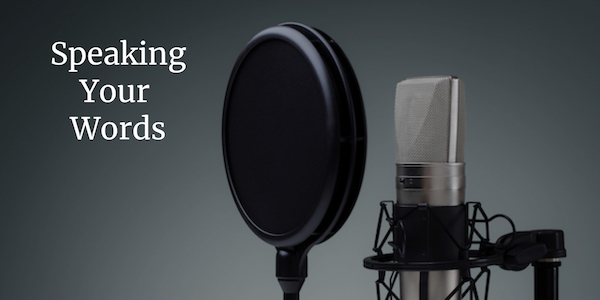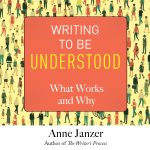Tuesday, August 13, 2019
 Creating an audiobook is not a trivial task. As a nonfiction author, I’ve decided to narrate my own books rather than hiring it out to the professionals.
Creating an audiobook is not a trivial task. As a nonfiction author, I’ve decided to narrate my own books rather than hiring it out to the professionals.
I hope that audiobook readers cut nonfiction authors some slack. There is something authentic about hearing the author’s own voice in the words. Or so I tell myself. In that firm belief, I recently recorded the audiobook of my latest book, Writing to Be Understood.

This is the fourth audiobook I’ve narrated (the fifth if you include the two editions of Subscription Marketing), and each has improved on the one before.
Even if you’re not recording an audiobook, you can learn a great deal by reading your work aloud, from start to finish. Every last word. Really.
Here are a few of the lessons I’ve learned from narrating my books:
Narrating isn’t as easy as it seems
When reading silently, you imagine how wonderful you’ll sound reading aloud. We all sound pretty great in our own minds.
That imagined voice is much more fluid than your physical speaking voice. When you get in a recording studio, with a microphone inches from your head, fluidity is even more elusive. You may trip over your own tongue, or get distracted by something as you read, or lose your place and not see what’s coming next.
As a singer, I find that narrating is kind of like sight-singing (reading unfamiliar music as you sing.) You put yourself in a zone of intense focus; part of you monitors the current notes while another part keeps track of what’s coming up and starts calculating tricky intervals in advance. Narrating requires a similar kind of intense focus. One small distraction can cause a train wreck. I suspect that listeners can detect if your attention wanders, too.
Don’t be judgmental about typos until you’ve narrated your own writing
Each of my books goes past a professional copyeditor and then, after layout, has another proofreading/copyediting pass. Even so, small things slip past: a missing word here, a homophone there. I suspect that most of them happen when I make “just one tiny change” to the text.
I spotted a few of those doing the slow work of reading aloud. Happily, I could fix them. But still, the book has been out a year already.
The persistence of typos is a testament to the Curse of Knowledge, or our inability to forget what we already know. Because we remember the meaning of a sentence, we “see” what’s on the page, even if it’s not there. This reading process is like how your visual systems fill in what’s in your real blind spots. (If you don’t believe it, try this blind spot experiment from the San Francisco Exploratorium.)
It’s tempting to feel superior when pointing out the typos in published works. It’s distressing to find them in your own.
Conversational prose is harder than you think
The real test of whether your writing seems “conversational” happens when you read it aloud. Long or complex sentences test your oratorical skills.
If you find yourself using vocal inflections to make the meaning clear, think about the poor reader who doesn’t have the benefit of those hints.
I pride myself on writing fairly short sentences, but I did encounter a few that went on for a while, forcing me to find a place to catch my breath.
Writing in an easy, conversational tone requires careful revision.

Relish the sound of the prose
Reading aloud surrounds you with the sound and rhythm of your words. There’s inherent poetry in prose, even nonfiction writing. Construct your words with care, and leave the occasional gems for readers to enjoy.
Spend a little time on a carefully crafted sentence, alliterative phrase or pithy observation. Even if your subject is technical or abstract, your writing can sparkle.
The careful, deliberate reader and the attentive audiobook listener will notice and appreciate the effort. Polish your words for them, and for yourself.
Applying the lessons of narrating to writing
I believe that narrating my own audiobooks has made me a better writer. As I work on book after book, the experience of recording the last one informs decisions about the next.
No matter what kind of writing you do, try reading your finished work aloud. Better yet, record it and listen. How does it sound?
Check for clarity. If you struggle to get through a passage or sentence when reading aloud, see if you can fix it to flow better, so the reader won’t get stuck when encountering it for the first time.
Monitor your “boredom” meter. If you start to feel bored when reading aloud, or listening to the recording, think about your poor reader. Add more anecdotes, metaphors, or clever turns of phrase to keep them engaged.
Enjoy the rhythm and sound of the prose. If there’s a passage that’s particularly fun to read, pay attention. What makes you enjoy it? See if you can include more of this in your next work.
Related Resources
Mind Your Tone of Voice
Writing for Overloaded Readers: It’s Not Dumbing Down
Listen to an excerpt from Writing to Be Understood:
Cuesta Park Consulting & Publishing publishes books and online courses for writers and marketing professionals. Books are available in print, ebook, and audiobook formats from a wide range of retailers. For more information, visit AnneJanzer.com.